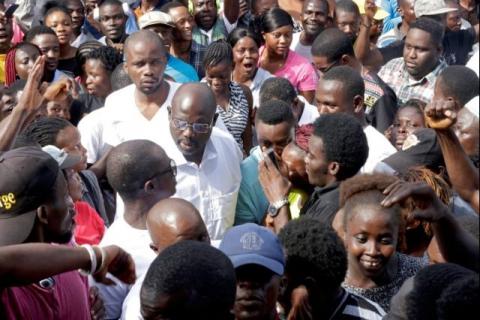Advertisement
Soccer star Weah and VP Boakai near Liberia presidential run-off
MONROVIA (Reuters) - Liberian former soccer star George Weah and Vice President Joseph Boakai were comfortably ahead in partial presidential election results announced on Saturday, and look set to contest a run-off next month.
Weah and Boakai lead the 20-candidate field to succeed Nobel Peace Prize winner Ellen Johnson Sirleaf in what would be Liberia's first democratic transfer of power in more than 70 years.
Weah received 39.2 percent of roughly 1.2 million ballots cast in nearly three-quarters of polling stations, ahead of Boakai, who had 29.6 percent of the vote, the commission said. Charles Brumskine, a lawyer, was a distant third with 9.7 percent.
The final certified results from Tuesday's poll must be announced by Oct. 25, although provisional results from the remaining precincts are expected in the coming days.
The commission said that ballots would be re-cast in two polling places in Nimba County due to irregularities, although that measure only concerns a few thousand votes.
CIVIL WAR
Weah became the first non-European to win the European player of the year award in 1995, the same year he picked up the African and World player of the year awards.
He finished runner-up to Johnson Sirleaf in a 2005 election that helped draw a line under years of civil war that killed hundreds of thousands of civilians. He has been a senator for the opposition CDC party since 2014.
Boakai, the former head of Liberia's petroleum refinery company and agriculture minister, has served as Liberia's vice president since 2006 and represents the ruling Unity Party.
Brumskine has said the vote was marred by fraud and that he would request a re-run. However, he has yet to produce evidence of cheating and international observers said they saw no major problems.
Johnson Sirleaf's 12 years in office have seen the consolidation of Liberia's post-war peace and the quadrupling in size of the national economy. However, many Liberians complain about poor public services and widespread corruption and say they are eager for a new president.
Weah's strong first-round performance drew mixed reactions on the streets of Monrovia, the capital.
One woman held a small radio close to her ear as the latest results were read out by the state broadcaster. "We will see a new president now come next year," she said. "Our son Weah will be the next president."
Standing nearby, a man in his late 50s, Cyrus S. Mulbah, had a different view.
"It will be a sad mistake if this country goes in the hands of Weah and his people," he said "This is not a football field."
(Reporting James Giahyue; Writing by Aaron Ross; Editing by Andrew Bolton)



















Add new comment